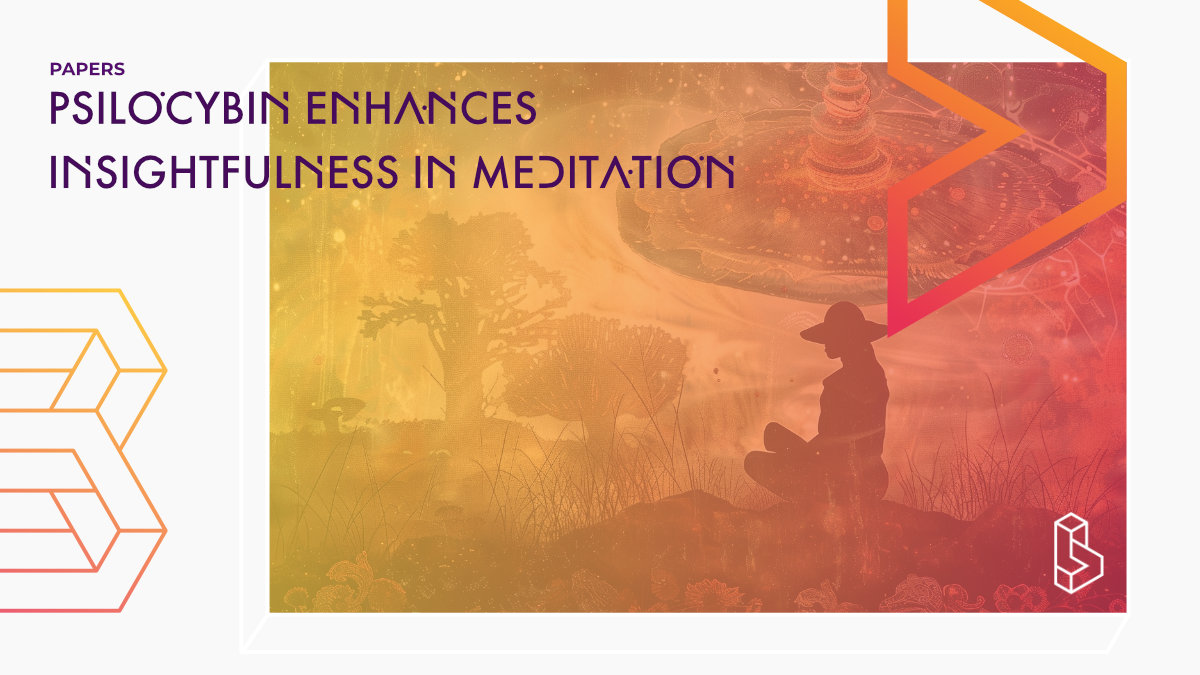This placebo-controlled study (n=36) investigated fMRI data from experienced meditators undergoing focused attention and open monitoring meditation before and after a five-day psilocybin-assisted (22mg/70kg on day 4) meditation retreat. Psilocybin-induced positive derealization, coupled with enhanced open-monitoring meditation, correlated with the optimal transport distance between open monitoring and resting state. This suggests that enhanced meta-awareness through meditation combined with psilocybin may mediate insightfulness, offering potential novel brain markers for positive synergistic effects between mindfulness practices and psychedelics.
Abstract of Psilocybin enhances insightfulness in meditation: a perspective on the global topology of brain imaging during meditation
“In this study, for the first time, we explored a dataset of functional magnetic resonance images collected during focused attention and open monitoring meditation before and after a five-day psilocybin-assisted meditation retreat using a recently established approach, based on the Mapper algorithm from topological data analysis. After generating subject-specific maps for two groups (psilocybin vs. placebo, 18 subjects/group) of experienced meditators, organizational principles were uncovered using graph topological tools, including the optimal transport (OT) distance, a geometrically rich measure of similarity between brain activity patterns. This revealed characteristics of the topology (i.e. shape) in space (i.e. abstract space of voxels) and time dimension of whole-brain activity patterns during different styles of meditation and psilocybin-induced alterations. Most interestingly, we found that (psilocybin-induced) positive derealization, which fosters insightfulness specifically when accompanied by enhanced open-monitoring meditation, was linked to the OT distance between open-monitoring and resting state. Our findings suggest that enhanced meta-awareness through meditation practice in experienced meditators combined with potential psilocybin-induced positive alterations in perception mediate insightfulness. Together, these findings provide a novel perspective on meditation and psychedelics that may reveal potential novel brain markers for positive synergistic effects between mindfulness practices and psilocybin.”
Authors: Singer Berit, Daniel Meling, Matthias Hirsch-Hoffmann, Lars Michels, Michael Kometer, Lukasz Smigielski, Dario Dornbierer, Erich Seifritz, Franz X. Vollenweider & Milan Scheidegger
Summary of Psilocybin enhances insightfulness in meditation: a perspective on the global topology of brain imaging during meditation
Meditation and psychedelics have attracted increasing scientific interest in recent years. This article targets an alternative approach in which a novel topological data analysis method is applied.
Meditation can be understood as a form of mental training with various aims, including improving cognitive and emotional self-regulation, changing attitudes toward the self and others, and cultivating positive emotional states. Psychedelics are a class of consciousness-modulating substances.
Meditation has been shown to improve mental health and psychological well-being in many randomized controlled studies. However, an increasing amount of evidence indicates potential adverse effects related to meditation practice, as well as potential benefits from psychedelics use.
Find this paper
https://doi.org/10.1038/s41598-024-55726-x
Open Access | Google Scholar | Backup | 🕊
Cite this paper (APA)
Berit, S., Meling, D., Hirsch-Hoffmann, M., Michels, L., Kometer, M., Smigielski, L., ... & Scheidegger, M. (2024). Psilocybin enhances insightfulness in meditation: a perspective on the global topology of brain imaging during meditation. Scientific Reports, 14(1), 7211.
Study details
Compounds studied
Psilocybin
Placebo
Topics studied
Healthy Subjects
Study characteristics
Placebo-Controlled
Double-Blind
Participants
36
Humans
Compound Details
The psychedelics given at which dose and how many times
Psilocybin 22 mg | 1xLinked Clinical Trial
Beyond the Self and Back: Neuropharmacological Mechanisms Underlying the Dissolution of the SelfThe aim of the study is to identify neural signatures, behavioral and phenomenological expressions of self-related processes including: sense of agency, semantic distinction between self and other, selflessness (altruism), social agency, embodied self (interoception), perceptual functioning of dissolved self including hallucinations and crossmodal processing, and finally the mystical type dissolution of the self.

